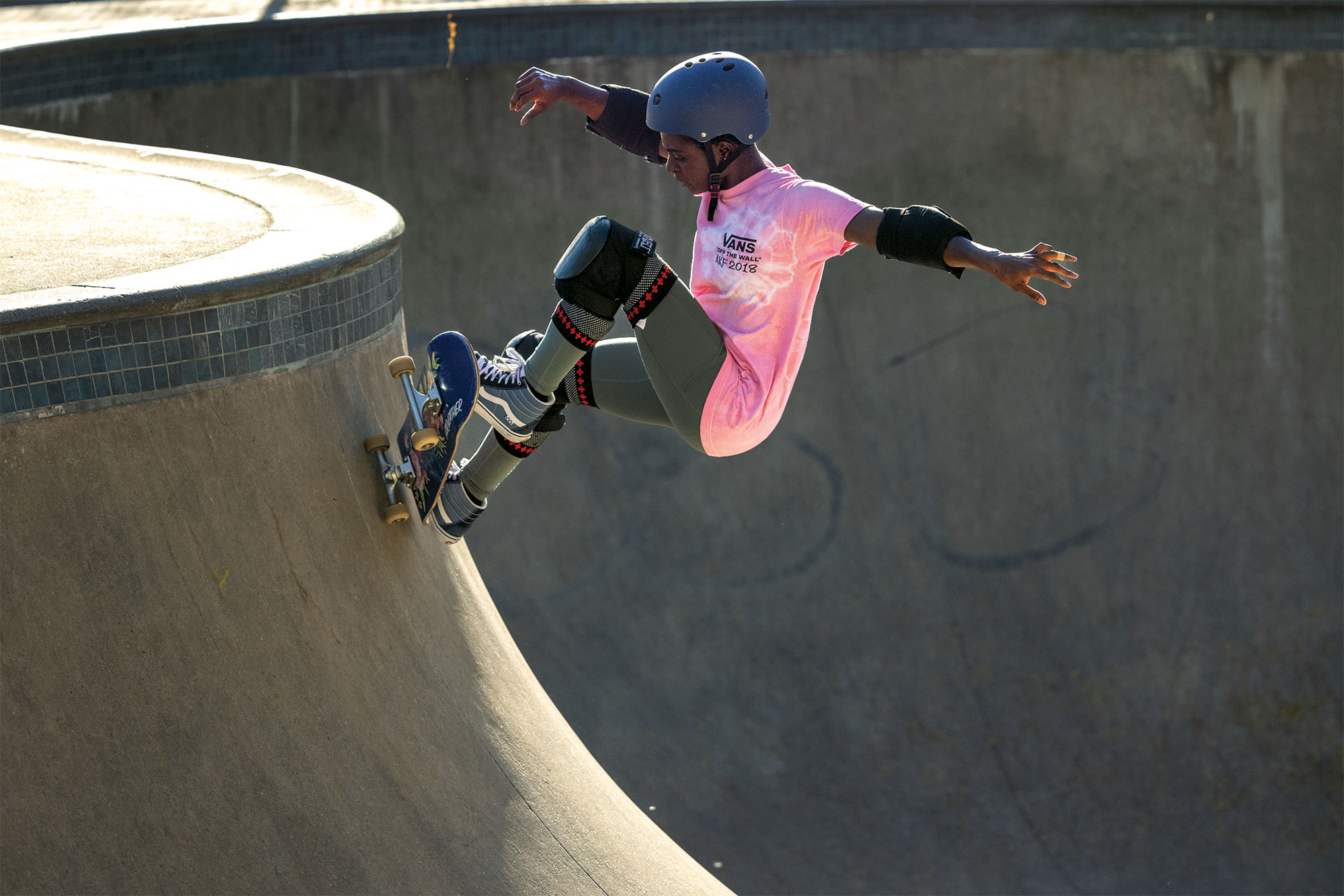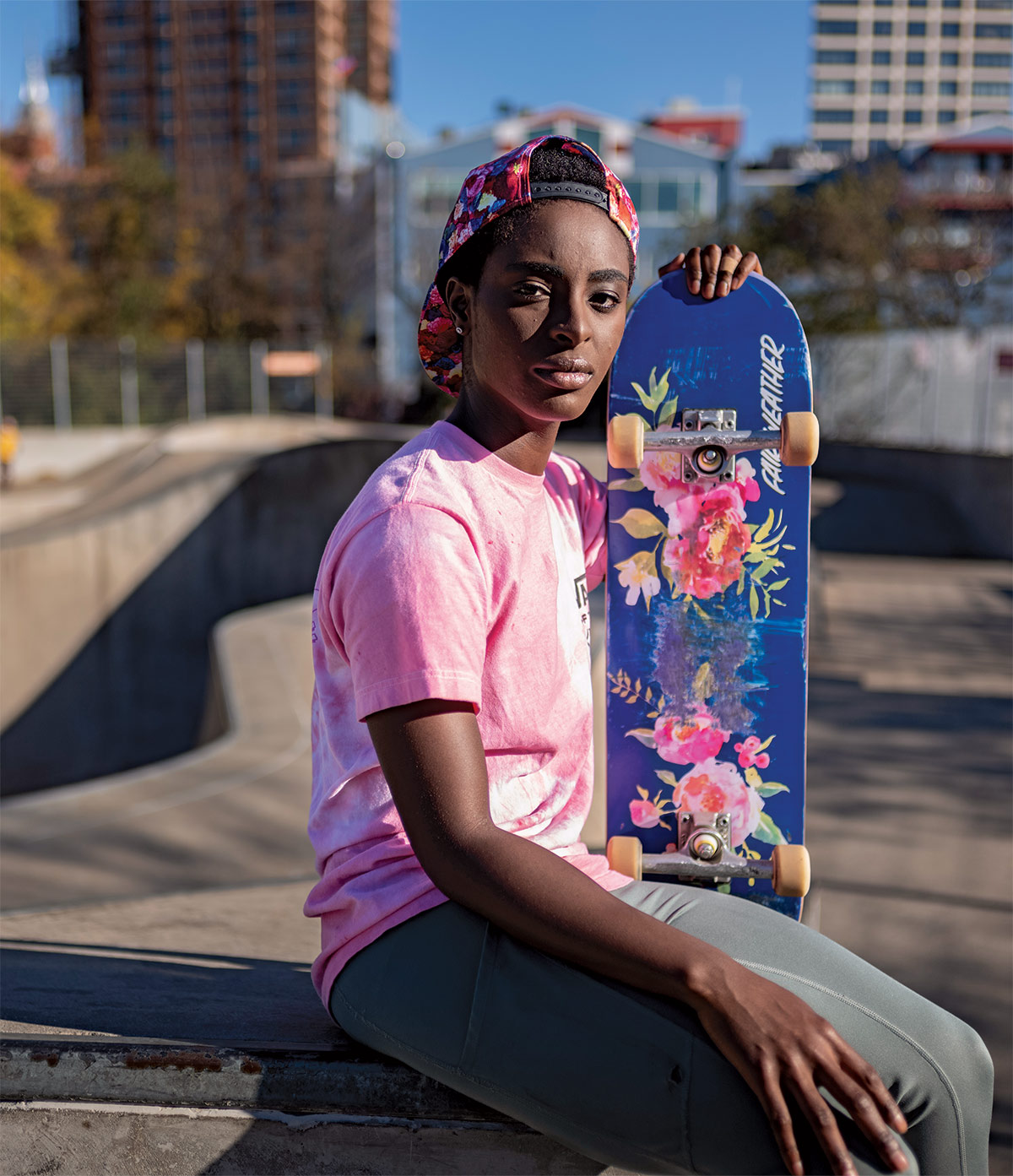
Dropping In

Dropping In
Skateboarding coach Mame Fremah Bonsu ’14 fell in love with the sport thanks in no small part to the Tony Hawk Pro Skater video game franchise. Before videos were readily available online, devotees swapped VHS tapes of their favorite riders; Bonsu, a native of Lewiston, Maine, didn’t have access to these videos but immersed herself in skateboarding via her Nintendo GameCube.
Fast-forward to last June, when Bonsu was working at Substance Skatepark in Brooklyn, N.Y., where she lives, and happened to meet — and then skate with — the legendary Tony Hawk.
“He randomly came in, and we had a session together,” she says. “It was just super cool, because he’s so down to earth. He was offering me skating tips, and I’ve been able to keep in contact with him, just asking about things.”
For Bonsu, the line from skating as a childhood passion to a full-time profession has had its fair share of twists and turns.
After taking time away from skating in middle and high school, she returned to it at Swarthmore and spent her summers developing a feel for transition skating at her local skatepark in Maine. The term refers to using quarter-pipes, mini ramps, and half-pipes, says Bonsu. “Transition skating literally started with ditches, big gutters, and empty backyard pools,” she says.
Postgraduation plans took Bonsu to New York City to work in advertising, and she mostly thought of skateboard coaching as a side hustle.
“It basically started when some kids asked me to help them in the park at the time, and the parents were watching, and then they came to give me money,” Bonsu says. “Other parents said, ‘Oh, can you teach my kid, too?’ I gave two to five lessons on a weekend, and then I went back to work on Monday.” Over time, Bonsu felt increasingly out of place in the corporate world and faced an identity crisis that pushed her out of the advertising sphere.
Tricks of the Trade
Goofy: Right foot forward, left foot back (push foot).
Fakie: Roll backward in your normal stance.
Switch: Skate opposite to your normal stance (i.e. a regular skating goofy).
Street Skating: “Street, sidewalk, ledges, curbs, stairs, rails — skaters find spots around the city or skate these features that are built in skateparks,” says Bonsu. “A lot of technical tricks such as the kickflip are associated with the street category, but technically most of this can be brought to transition.”
Encouragement from her therapist and the changing circumstances of the pandemic — which Bonsu credits with providing “a whole new weight to re-examining life” — led her to pursue coaching as a full-time job.
She began her own company, Anansi Skatelife Inc., named in homage to a spider-like folktale character central to many West African people; Bonsu, who was born in the U.S. but spent part of her early life in Ghana, admires Anansi’s craftiness in outmaneuvering larger foes and wants to encourage her students to show the same creativity in solving their own problems. Anansi also serves as a reminder of her ties to Ghana, which she hopes to represent at the Olympics and help foster the growth of the emerging African skating scene.
It’s fitting that Bonsu found her way back to skateboarding because of the central role it’s played in her life. Describing it as her “first form of therapy,” she says skateboarding has taught her how to navigate her anxieties, feel balanced in the world, and learn how to fall — both on the board and in her day-to-day life.
“I feel like there’s so much of my external world that overlaps with skateboarding,” she says. “For example, if I lean back too much on my board, I’ll wipe out. And if I think of all the other things that are in the past that I can’t control, that are behind me, that I’m leaning back on, it’ll cause me another kind of pain.”

As a kid, she was largely surrounded by white, male skaters at her local park. “When you’re a minority in a particular community or culture, it can be easy to get into the mind frame of ‘How do I represent my people?’” she says. “As a Black woman, I have experienced — and also placed on my own shoulders — the responsibility of setting an example for ‘the rest of us,’ at my own expense, constricting how I moved forward. If you aren’t mindful, it can pull you away from the experience of being you.”
Much like her decision to leave the corporate world for skateboarding, Bonsu is motivated by her desire to represent herself on her own terms, to display her truth as authentically as possible.
“Skating has always brought me a sense of freedom in difficult times,” she says. “I want other Black, female skaters of any age to feel that same sense of liberation.”